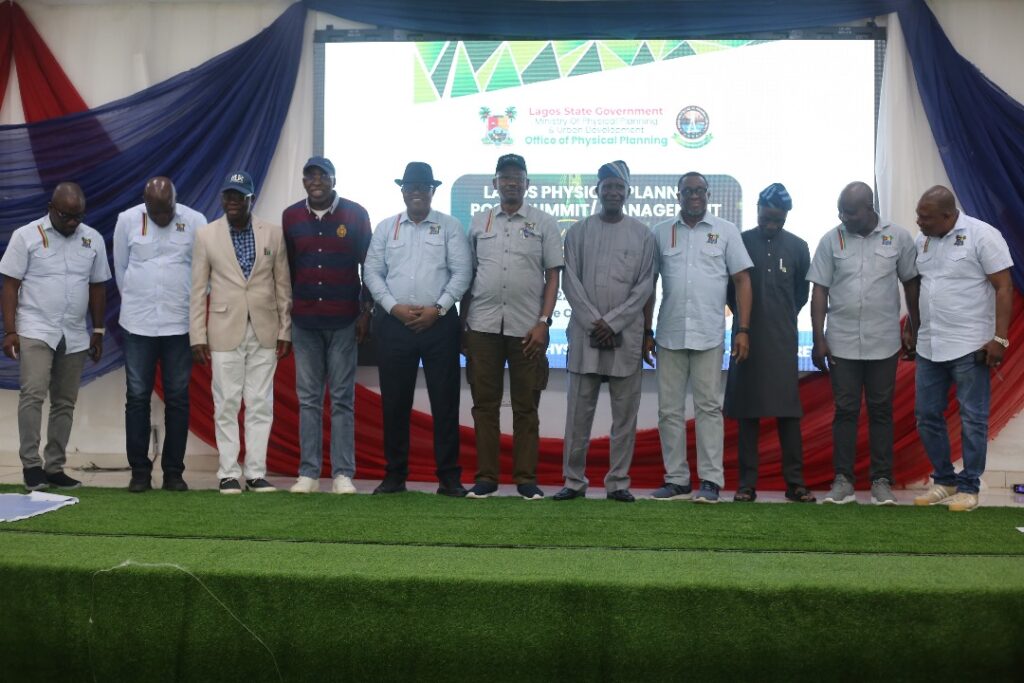Lagos Town Planners resolve to cut building approval deficit

Town Planners in the employment of the Lagos State Government, under the auspices of the Ministry of Physical Planning and Urban Development, have reaffirmed their determination to drastically reduce the persistent building approval deficit across the State through improved coordination, strengthened enforcement, enhanced staffing, and a fully digital, technology-driven planning framework.
A statement from the Director Public Affairs, Mukaila Sanusi, said, this resolution was reached at the Lagos State Physical Planning Post-Summit/Management Retreat, held recently at Jubilee Chalets, Epe, where officials from relevant Ministries, Departments and Agencies (MDAs), professionals and stakeholders met to evaluate progress made since the 2024 Lagos Physical Planning Summit and agree on sustainable planning strategies for Africa’s largest megacity.
In his address to participants, the Deputy Governor of Lagos State, Dr. Kadri Obafemi Hamzat underscored the central role of proper land-use planning in the economic prosperity, safety, and liveability of the state.
” Proper land planning is fundamental to the success of Lagos State. Citizens and developers must adhere strictly to planning regulations, while the government must ensure that its processes are transparent, fair, and efficient. We must balance vertical developments, especially along high streets, with less vertical ones on inner streets to optimise our limited land resources while preserving tradition,” the Deputy Governor stated.
He further directed that the databases of all planning-related MDAs be linked to facilitate seamless processing of development applications and improve public confidence in the planning system.
Earlier, the Commissioner for Physical Planning and Urban Development,Dr. Oluyinka Olumide, who described the retreat as a turning point for strengthening Lagos planning systems to meet the realities of rapid urbanisation and set a new benchmark for urban governance in the country, said that approval deficit was both a governance and safety concern that must be urgently addressed.
” The building approval deficit in Lagos State is not just a statistical problem; it is a development and public safety issue. This retreat marks a renewed commitment by all professionals in the system to remove bottlenecks, simplify procedures, embrace digital tools, and ensure that development is carried out strictly within the framework of the law,” he said.
He added that the Ministry would continue to strengthen regulatory institutions, invest in innovation, and improve service delivery through ongoing reforms.
The Permanent Secretary, Office of Physical Planning, Engr. Olumide Sotire, in presenting the harmonised deliverables to the Deputy Governor, emphasised the importance of data integration and institutional realignment, saying that the State was progressively repositioning its planning institutions to become more proactive, coordinated and technology-driven as the adoption of Spatial Data Infrastructure (SDI), the Lagos Land Use Classification System and the interlinking of MDA platforms would significantly reduce turnaround time and improve efficiency.
A notable highlight of the retreat was the presence and active participation of former Commissioners and former Permanent Secretaries of the Ministry, including Tpls. Toyin Ayinde, Francisco Abosede, Idris Salako and Ayodele Adediran, whose contributions enriched deliberations and strengthened institutional memory. Their guidance reinforced the importance of continuity, policy consistency, and long-term vision in strengthening physical planning governance in Lagos State.
Participants, including the President Real Estate Devlopers Association of Nigeria( REDAN), Bamidele Onalaja identified key challenges hampering effective planning, including inadequate staffing, outdated base maps, institutional overlaps, and poor public trust, which were acknowledged as major contributors to the approval backlog and unregulated developments.
Key resolutions from the retreat include full operationalisation of the Electronic Planning Permit System, restoration and modernisation of the LPPS Portal, state-wide adoption of Spatial Data Infrastructure (SDI), and fast-tracking the Lagos Land Use Classification System (208 digitally coded categories
Others are the recruitment of additional technical personnel across planning MDAs, establishment of more technical Departments in the Office of Physical Planning, and strengthening inter-agency collaboration within the Ministry, as well as Intensifying public sensitisation on the importance of obtaining planning approvals.




